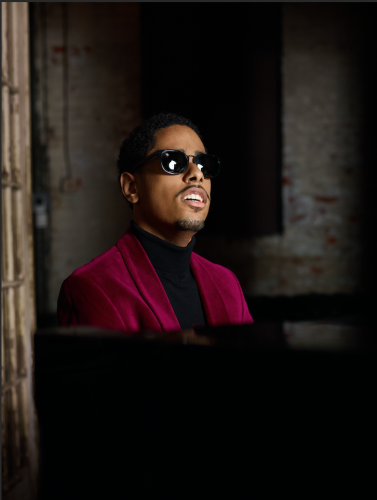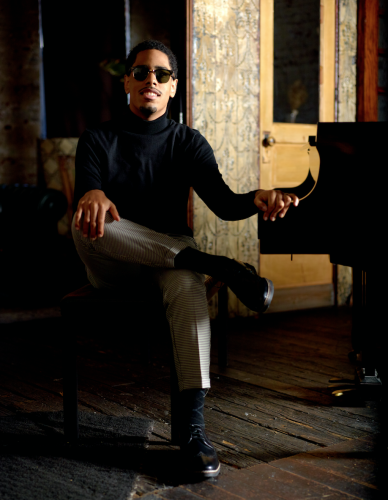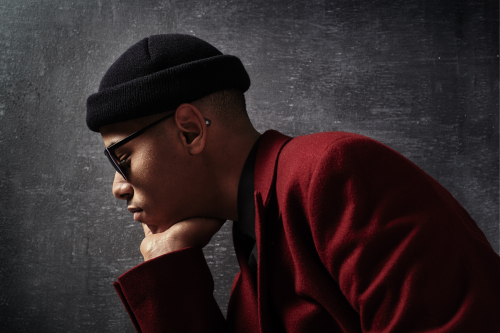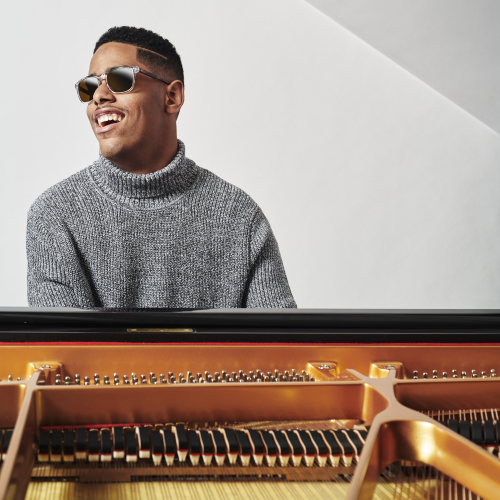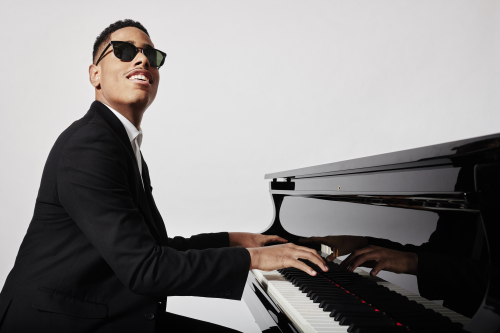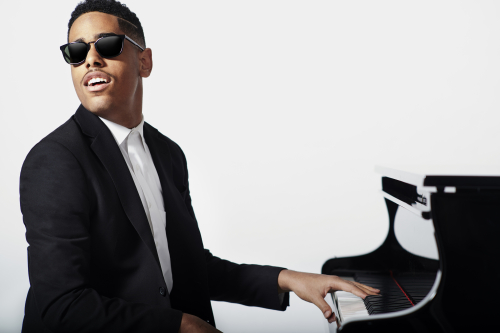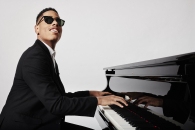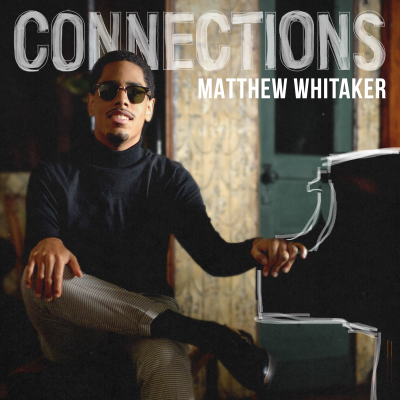Matthew Whitaker
Click  on photo to download high resolution version
on photo to download high resolution version
All rights reserved. Photos are for editorial use only.
Photos
Latest ReleaseView All
Connections
Release date: 8.13.21
Label: Resilience Music Alliance
Press Releases View All
Matthew Whitaker grows from phenom to phenomenal on timely new album Connections, out August 13 on Resilience Music Alliance
Read MoreBiography View
As more than a year of lockdown and collective isolation appears to be ending, Matthew Whitaker—the twenty-year old keyboardist from Hackensack, New Jersey—has released an exciting, expansive new recording entitled Connections. Aptly titled for this pivotal moment, the sixteen-track collection is his third album and serves as both a bold declaration of Whitaker’s maturity as a player, composer and bandleader, and as a statement of musical connection—and re-connection, as Whitaker points out.
“Connections is really about this idea of community, of musicians and family and everyone really, coming back together after being separated for so long,” Whitaker says. “It’s about how grateful I am for the connections we have with each other musically and spiritually as well. More than my other albums, this one has music that was created in the studio, improv moments that happened live. A few of these songs I wrote during the pandemic so I’m happy we were able to record those, and I’m excited. This is more expansive than anything else I’ve done!”
Connections features music composed both before and during (and in reaction to) the pandemic, and recorded mostly between March 2 and 4, 2021. It includes a generous mix of original compositions with message-driven titles of uplift and instruction (“A New Day,” “Acceptance,” “It Will be Okay,” “Stop Fighting”), balanced with familiar melodies by Whitaker’s musical heroes, from Duke Ellington (“Don’t Get Around Much Anymore”), Stevie Wonder (“Lately”), and gospel singer Richard Smallwood (“Trust Me”), to Duke Pearson (“Jeannine”), Chick Corea (“Spain”), and Thelonious Monk (“Bye-Ya”)—this last one a sparkling, standout duet with pianist Jon Batiste.
The performances on Connections reveal Whitaker’s burgeoning musical identity: one filled with deepening confidence, rhythmic vigor, and a marked melodic clarity. Dramatic entrances have become an aspect of his musical approach. Whether on piano, Hammond organ, Fender Rhodes or synthesizer, he doesn’t kick off a tune or improvisation as much as plunge into the music, twisting time and navigating structural shifts with fluidity. Relative to past recordings, he now pulls from a noticeably wider palette of modern jazz, Latin, and R&B sounds, still with a heady top-note of gospel—staying true to his roots. Fittingly, Whitaker offers a version of the venerable spiritual “His Eye Is On The Sparrow” as the album’s closing track.
On Connections, Whitaker’s prowess on a wide variety of keyboards is in full effect; “usually we’d go into the studio with whatever backline they have there,” says Whitaker. “But this time I said, ‘we’re gonna bring everything,’ and I was really able to do my thing.” It is clearly a studio effort—evidence of Whitaker’s growing maturity as a recording artist; some tunes were developed during sessions with improvised moments, some were constructed with layered textures and other flavors overdubbed later. Derrick Hodge, noted bassist and bandleader, produced Connections, and added his distinctive, textural bass sound to a number of tracks. “Derrick was very active during the recording—that’s what I love about him,” adds Whitaker. “He had some wonderful ideas which really pushed me to experiment more as a composer and arranger. I was hoping he would play bass and after all the tracking was done, he did record on a few tracks.”
Whitaker is buttressed on Connections by an A-level circle of talent that speaks to the pandemic-defying power of community. Many are familiar names in Whitaker’s lineups—guitarist Marcos Robinson, bassists Karim Hutton and Endea Jones, and drummers Isaiah Johnson, Otis Brown III, and Johnathan Blake. Special guests include keyboardist Jon Batiste, violinist Regina Carter, drummer Alvester Garnett and trumpeter Steve Oquendo—who provided arrangements on, and leads the punchy horn ensemble on “Jeannine.”
One of the most distinctive features on Connections is Whitaker’s speaking voice, taken from snippets of interviews and speeches and layered onto a couple of tracks, sharpening the album’s message-giving purpose. “The idea first came about when I was composing ‘Stop Fighting’—I wanted to have spoken words in the beginning,” remembers Whitaker. “Derrick took that idea and said, ‘I think we can have that throughout the entire album.’ So I sent him a bunch of audio files including my talk at a conference a few years ago about myself, with the doctors not having much hope for me, ‘eleven surgeries later…’—all that stuff. If Connections has an overall message, I think one is “Why Not?” Why can’t I do this, or that? Who says this is not possible? The other message of Connections is, this is who I am, now, at this moment when the world is coming back together.”
Connections serves as an impressive reminder of how far Whitaker has come‚ and how he has defied the odds from the outset. He was born in 2001 in Hackensack, New Jersey, premature by three months and blind, fighting his way to health through his earliest years. By age three, he exhibited an unusual musical acuity—picking out nursery rhymes on a toy piano—and by five, blessed with perfect pitch, he began piano lessons at The Filomen M. D'Agostino Greenberg Music School in New York City where he learned to play and read Braille music as well. To this day, he credits piano teacher Dalia Sakas and the FMDG experience in general for providing him the guidance at the start of his career.
While still a pre-teen, Whitaker started to perform with the band at the New Hope Baptist Church which his family attended. “I really grew up in that church—I first started playing drums while the drummer was on tour, and when the organist would show up late, I would fill in for him. Then our pastor at the time said, ‘Matthew you’re the organist’ and I’ve been the organist there for five years now. We’re online every Sunday with live streams now.”
Whitaker’s childhood transformed the word “premature” into a term of strength and accomplishment. He continued his studies at the Harlem School of the Arts and with Montlclair, NJ’s Jazz House Kids program through his adolescent years, and word of this talented child began to spread. At the age of 9, he enrolled in the Manhattan School of Music’s Pre-College Jazz program with support from the Jazz Foundation of America. A year later, he was chosen to perform as the opener for Stevie Wonder’s induction into the Apollo Theater’s Hall of Fame. At the age of 12, he was the subject of Thrive, a mini-documentary focused on his uncanny talent and brief journey so far. By 13, he became the youngest player ever endorsed by Hammond USA, manufacturers of the organ he had begun to play only four years before; at 15, he became an official Yamaha Artist, becoming the youngest musician to join that elite group of pianists.
By his early teenage years, with jazz as his primary focus and an ear open to a number of styles—from deep, African American roots to modern classical and even hard rock—Whitaker was leading his own bands and developing a sound that often called upon the energy and spirit of his Baptist upbringing. In 2016, he performed Stevie Wonder’s classic “I Wish” on FOX TV’s Showtime at the Apollo, and in early 2017, he released his debut album Outta The Box on the Jazz Foundation’s own label. It received wide critical acclaim, inside and far beyond the jazz world. One critic praised how the recording “showcases his vast influences and range” and labeled him “a prominent young voice in today’s jazz scene.”
With comet-like velocity, Whitaker’s musical growth continued as his star ascended. From 2017 through 2018, he headlined major theaters and music festivals with a tight, energetic group. He performed publicly with a dizzying array of top talent from Ray Chew, Christian McBride, Dr. Lonnie Smith, Rhoda Scott, Regina Carter and Jason Moran, to Jon Batiste, Cory Henry, Marc Cary, Arturo O’Farrill, James Carter, Roy Ayers, and even The New York Pops Orchestra. He appeared on the Today Show, Ellen Degeneres Show and the Harry Connick, Jr. Show.
In 2019, Whitaker released his sophomore album—Now Hear This—on the independent label Resilience Music Alliance. Downbeat awarded it four stars, calling his “spirit-raising ecstasy…a perfect launchpad for all that’s yet to come from this exceptional pianist.” CBS’s 60 Minutes program decided to report on Whitaker, shooting him at a headlining gig at the New Orleans Jazz & Heritage Festival, and consulting a neuroscientist who used an MRI to examine his brain activity and better understand his prodigious skills. The story aired nationwide in December 2020 in the midst of a global music industry lockdown brought on by the COVID pandemic.
In early 2021, as the world neared one full year of lockdown, the decision was made to return to the studio; Connections is an album made possible by, and in defiance of all that this pandemic has engendered. “For me, life has always been about rising to challenges,” Whitaker says.
One thing I take away from this lockdown is don’t be afraid to keep developing as a person and still be creating, even if you’re by yourself. I’m grateful that I have the resources available to do my thing even from home. We’ve been doing live streams from home and from church. I’ve also had a long time to think with so much going on in politics and protests and the world. I’ve learned to let the music speak—that goes with everything that I play. Let the music speak and you can hear it tell you how to think about this topic or another. That’s really what Connections is about.

